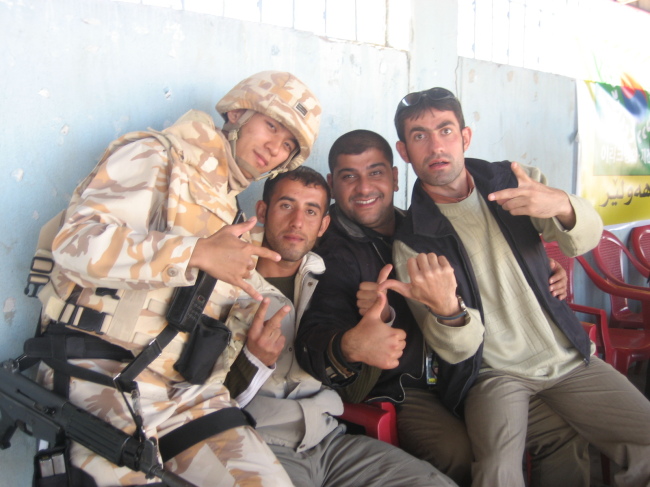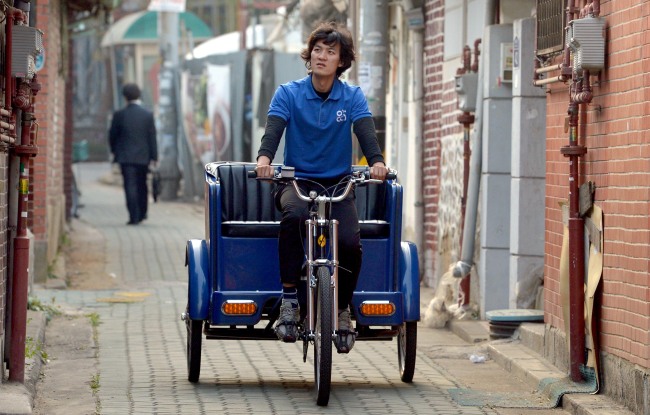Artee Pedicab president Lee In-jae’s resume bears witness to the storied life the young man has had in his 28 years so far.
A graduate of Cushing Academy in Massachusetts, Lee went on to study history at Wesleyan University in Connecticut, a private liberal arts college in the United States. After completing his freshman year, Lee, a Korean national, returned to the country to fulfill his mandatory military service.
For six months in 2006, Lee did a tour of Iraq, serving in the 11th Brigade in Erbil.
 |
Lee In-jae (left) poses with Kurdish and English-language interpreters in Erbil, Iraq, in 2006. |
“Working in civil affairs, I was always outside the base meeting with the locals, speaking in English through a Kurdish interpreter, asking them what they needed,” said Lee at a small coffee shop next to his office in Sajik-dong last month. “Most often they asked for a sewage system and bridge,” he recalled.
His ability to chat with strangers ― it took him nearly 10 minutes to order coffee because he had struck up a conversation with the woman manning the counter who he discovered had been to Iraq ― served him well working in the field in a foreign land, talking with people who were unknown to him.
Stepping outside his comfort zone appears to come naturally to Lee.
Upon being discharged from the military, Lee returned to university and graduated in 2010.
He then headed to Boston to visit a friend and ended up working as a rider at Boston Pedicab for three and a half months before flying to Seoul to look for a job.
Later that year, Lee landed a job with the Macquarie Securities’ compliance department, only to quit in February 2012.
In July 2012, Lee took a big gamble, opening up his own pedicab company with two bikes in partnership with Vincent Monaco, his best friend from high school, who ran a pedicab company in Boston.
“People said it wouldn’t work in Korea,” he said, adding “That drove me even harder. I wanted to show it could be done.”
Just getting the business off the ground was fraught with difficulties.
On a trip to Yeosu, South Jeolla Province, he saw the Expo 2012 Yeosu construction site and approached the expo committee for 10 bikes to be used during the Yeosu Expo, slated for May 12 to Aug. 12, 2012. He was told he was too late.
Undeterred, he went to China to research pedicabs there.
In the meanwhile, he applied for government funding for the incubation of young social entrepreneurs. He made the first cut, but didn’t make it among the 14 finalists.
Dipping into his severance pay and savings, he and Monaco together raised 10 million won and his high school buddy, who has since left the company, arrived in Seoul two weeks later.
The team ordered two bikes from China and Artee Pedicab got its fledgling start.
Lee must have known he was off to an auspicious beginning when around that time a Swiss pair paid 1,000 Swiss francs ($1,141) for an hour, thanking him for the best time the mother and daughter had in a long while.
 |
Lee In-jae, president of Artee Pedicab, rides through an alley in Ikseon-dong, northern Seoul, Wednesday. (Yoon Byung-chan/The Korea Herald) |
“It was only a week after I had started offering one-hour courses!” he said. The price for an hour-long ride is 25,000 won per person.
Today, 80 percent of Artee Pedicab passengers are Korean, with foreigners making up the rest. Most of the Korean passengers are Seoulites who appreciate the stories and sceneries of quaint, old neighborhoods. His foreign clients are mostly people on business trips to Korea who find themselves with a bit of time to explore the city. Riders conversant in English and Japanese are available for foreign customers.
Tourists from Southeast Asia, where there are similar vehicles ― such as trishaw, tuk tuk, or cyclo ― often mistake the pedicab as merely a mode of transportation and try to bargain over the price, Lee explained with a chuckle.
Artee Pedicab offers a number of courses in old areas of Seoul north of the Hangang River. The Romance Course includes a 15-20 minute walk through the hanok village of Gahoe-dong. The History Course takes passengers through the neighborhood around Changdeokgung Palace and Bukchon village.
“Because I like history, 166 Ikseon-dong Course is my personal favorite,” said Lee. This course snakes through the hanok village nestled between Insa-dong and Jongmyo, a Joseon-period royal shrine that was built by the developer who also developed Gahoe-dong, and the original Pimatgol, a narrow alley favored by commoners who wanted to avoid having to bow to high-ranking officials and nobility riding through the city high on their horses. “The alley here traces its roots to the Goryeo period,” said Lee, an avid history buff.
The next two to three years might see additions to the current courses to include Jeong-dong and the Dongdaemun Design Plaza and Park, Lee predicted.
“We do historical tours because we are here. If we were in Busan, we would be offering something else,” he said.
“My philosophy is you only live once, why not pursue your happiness,” said Lee. “I have no grand goal. I just hope every rider has fun while they ride and that that aura will rub off on the passengers,” he said.
Four full-time riders and 17 part-time riders work at Artee Pedicab, riding an average of more than 30 hours per week. The fulltime riders train the pool of part-time riders who come from various walks of life, including civil servants, office workers and students.
Not everyone can become a rider; they must pass a screening. Potential riders are given a month-long training course in safety and history, after which the current riders vote on whether to take in the trainee as a new rider.
Into the second year of business, Lee is now used to the physical rigors of riding with passengers on tow. “I don’t do any additional physical training. Riding is enough workout,” said Lee.
Pedicab is a highly seasonal business, the months of March through October being the peak season, but demand is there. Artee Pedicab has grown from a 2-pedicab to 14-pedicab business within a period of two years.
At the moment, the lack of regulations and licensing scheme is an obstacle in expanding his business, Lee said.
“There is no precedence, no where to ask. For example, we had great difficulty finding an insurance company,” he elaborated.
“We are proud because we are drawing a map on blank paper,” Lee said, his eyes earnest.
“I want to go back to simply riding and talking with people. I felt that I was doing something good and people appreciated that. That was my motivation in the beginning,” he said. Now, he is motivated when riders and customers thank him.
By Kim Hoo-ran, Senior writer
(
khooran@heraldcorp.com)









